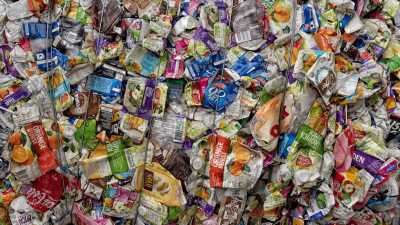‘Australia is way behind’: Recycling targets fall out of reach

Australia is set to miss its plastics recycling target by a wide margin, with the packaging industry conceding for the first time that the pledge to recycle 70 per cent of plastic waste by 2025 almost certainly cannot be met.
It means hundreds of thousands of tonnes of plastic that could be reused are polluting the environment or going into landfill.
Confidential documents prepared for industry stakeholders show Australia was recycling only about 16 per cent of its plastic waste in 2021, far short of the 70 per cent target, and a lower rate than many other developed countries.
If there was a huge rollout of new recycling centres that were operational by 2025, the nation could achieve a plastics recycling rate of up to 60 per cent, the documents said.
The low recycling rate had been stagnant for three years, dropping slightly from 18 per cent in 2020. On current figures, Australia would have to recycle or compost 608,000 tonnes of additional plastic waste each year to meet the 70 per cent target.
The documents formed part of a briefing for stakeholders taking in data up to the third quarter of 2022, produced by the Australian Packaging Covenant Organisation (APCO), the body responsible for co-ordinating action to meet the nation’s recycling targets.
APCO has 1500 business members representing large packaging producers, such as Visy Industries, Coca-Cola Europacific Partners and Coles and Woolworths supermarkets.
Chris Foley, the chief executive of APCO, said the organisation had met stakeholders in the past six months and “openly discussed the likelihood that the targets won’t be met by 2025 and more needs to be done”.
“Knowingly set as a stretch goal back in 2018, the targets were deliberately ambitious to encourage bold activity towards the development of a circular economy for packaging, rather than setting incremental targets that would only have led to incremental progress.”
Industry insiders said APCO and policymakers were now working on the assumption that Australia would fail to meet the 2025 target.
“What they haven’t said in public is that they’re not going to meet the target, and in fact probably going to get nowhere near it,” one of the stakeholders who received the briefing said. “The data they’ve shared in private shows … they are miles off.”
The revelations follow the collapse of the nation’s largest plastic bag recycling scheme last November.
The REDcycle scheme, in which shoppers could drop off plastic bags and other items at Coles and Woolworths supermarkets for recycling, failed partly due to a fire at a processing plant. The company running the scheme secretly stockpiled thousands of tonnes of plastic in warehouses rather than recycling it.
Plastic waste being stored for processing at a site in Laverton, Melbourne.Credit:Joe Armao
Federal and state governments, along with APCO, signed up to the 70 per cent by 2025 target in 2018, and the pledges form a key part of the national waste plan.
Environment Minister Tanya Plibersek, who has previously said the 2025 target was at risk and signalled strong but unspecified regulatory action, promised action and blamed the previous government.
“Thanks to serious failures by the previous Liberal government, Australia is way behind on its recycling targets,” Plibersek said. “If business doesn’t voluntarily step up on plastics, I will regulate.”
The government has allocated $250 million to help build or upgrade 48 additional recycling plants, 11 of which are already operational.
Australia’s plastics recycling rate is now higher than the global average, which according to the OECD is just 9 per cent, but is behind the claimed rates in many other developed countries.
In Europe, an average of 32 per cent of plastic waste is recycled, though different methods of data gathering make comparisons with Australia difficult.
In Germany, most households have four bins – blue for paper and cardboard, yellow for plastic and soft metal, green for organic waste, grey for other waste – and the nation has already claimed a 66 per cent recycling rate.
Environment groups said there should be penalties when the packaging industry failed to meet its recycling promises.
“I think that the industry has been playing a public relations game for many years on this,” said Jeff Angel, the director of recycling group the Boomerang Alliance.
“Behind the scenes, I think APCO believed they wouldn’t be held to account for missing their targets. But now the minister has no choice but to regulate.”
Get to the heart of what’s happening with climate change and the environment. Our fortnightly Environment newsletter brings you the news, the issues and the solutions. Sign up here.
Most Viewed in National
From our partners
Source: Read Full Article
